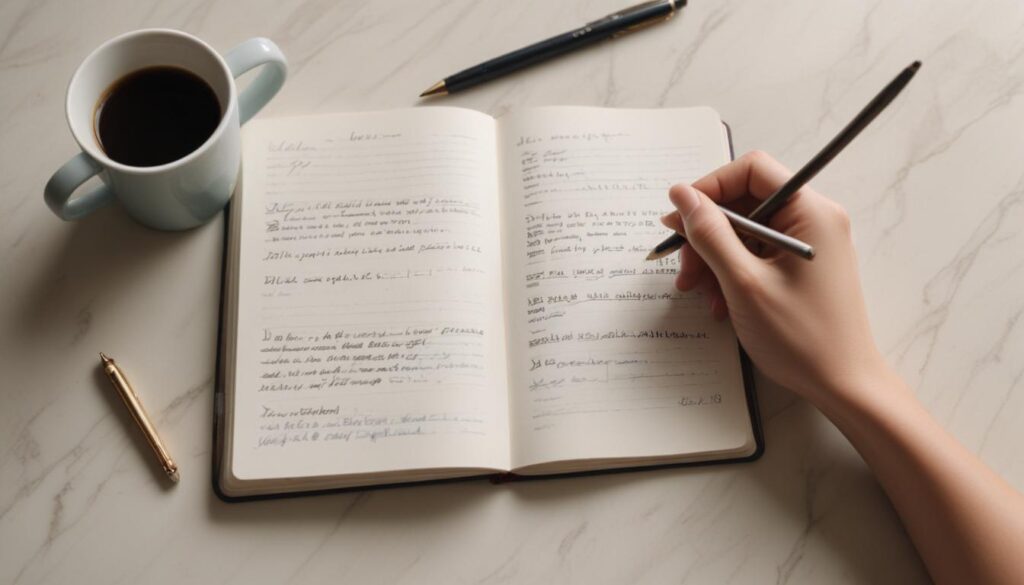Now Reading: The Life Changing Power of Journaling
-
01
The Life Changing Power of Journaling
The Life Changing Power of Journaling

Unlock Your Potential The Life-Changing Benefits of Journaling
The Benefits of Journaling Reflecting on Your Life
Do you ever feel like your mind is running a marathon you never signed up for? Thoughts about work, family, and your endless to-do list race around, leaving you feeling overwhelmed and disconnected from what truly matters. It’s easy to feel lost in the noise of daily life, struggling to understand your own feelings or make clear decisions. What if there was a simple, private, and powerful way to untangle that mental clutter, find your focus, and reconnect with yourself? That tool is a journal, and the practice of writing is your path back to clarity.
Journaling is more than just keeping a diary of events. It is an active conversation with yourself, a dedicated space to explore your thoughts, fears, and dreams without judgment. By consistently putting pen to paper (or fingers to keyboard), you create a habit of self-reflection that can profoundly impact your mental health, personal growth, and overall happiness. It’s an accessible practice for everyone, requiring nothing more than a few minutes and a willingness to be honest with yourself.
Find Remarkable Clarity and Reduce Stress
One of the most immediate benefits of journaling is its ability to act as a mental release valve. When your mind is crowded with anxious thoughts, unresolved problems, and lingering emotions, it creates a state of chronic stress. The simple act of writing these thoughts down transfers them from your mind to the page. This “brain dump” creates mental space, allowing you to breathe easier and see your challenges from a new perspective. It externalizes the chaos, making it feel less overwhelming and more manageable.
This process does more than just clear your head; it actively helps you process emotions. Instead of letting feelings of anger, sadness, or anxiety fester internally, writing about them forces you to articulate what you are experiencing and why. This engagement helps you move from simply feeling an emotion to understanding it. Over time, you’ll find that journaling about a stressful situation can lead to surprising solutions or, at the very least, a sense of acceptance and peace that allows you to move forward.

Boost Your Self Awareness and Emotional Intelligence
How well do you truly know yourself? Journaling is a powerful mirror for your inner world. As you write consistently, you begin to recognize recurring patterns in your thoughts, behaviors, and emotional responses. You might notice that a certain type of interaction always leaves you feeling drained, or that specific activities consistently bring you joy. This is the foundation of self-awareness—the ability to see yourself with honesty and clarity.
This heightened self-awareness is the first step toward greater emotional intelligence. By understanding your own emotional triggers and tendencies, you gain the power to manage them more effectively. Instead of reacting impulsively to a situation, you can pause, recognize the emotion rising within you, and choose a more thoughtful response. This skill not only improves your relationship with yourself but also enhances your relationships with others, as you become more empathetic and better at navigating complex social dynamics.
How to Start Your Journaling Practice Today
The idea of starting a journal can be intimidating. The pressure of the blank page might make you feel like you have nothing important to say. The key is to let go of perfection. There are no rules. Your journal is for you alone, so it doesn’t need to be poetic, grammatically perfect, or even coherent to anyone else. The goal is simply to start.
Commit to just five minutes a day. You can use a beautiful notebook, a simple legal pad, or a notes app on your phone. To make it even easier, begin with simple prompts. Don’t try to summarize your entire day at first. Instead, focus on a single question to guide your thoughts. You could write about what you are grateful for, describe a challenge you are currently facing, or explore one thing you learned today.
Prompts like, “What is one thing I can do tomorrow to make the day better?” or “What feeling is strongest in me right now, and why?” can unlock a wealth of insight. Before you know it, your five-minute exercise will become a cherished ritual of self-discovery and a cornerstone of your well-being.




































